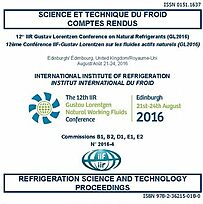
Document IIF
Les frigorigènes naturels utilisés dans des applications commerciales légères : étude comparative entre les avantages et inconvénients respectifs du CO2 et du propane.
Natural refrigerants for light commercial applications: a fair comparison of the pros & cons of CO2 and propane.
Résumé
Glass door merchandisers are used in grocery and convenience stores to display chilled beverages or refrigerated foods. Among the natural refrigerants available, only propane (R290) and carbon dioxide (CO2, R744) are realistic candidates to replace currently used HFC refrigerants. While many of the thermodynamic and transport properties of R290 are favorable over R744, propane is listed as an ASHRAE A3 refrigerant and therefore bears an inherent flammability risk even when the refrigerant charge is limited to 150 g or less as required by applicable safety standards. While it seems possible to design and implement safe, low-charge hydrocarbon refrigeration systems, some manufacturers prefer solutions that completely eliminate the flammability risk and therefore focus on R744, which is a non-flammable, non-toxic, natural refrigerant listed as ASHRAE A1. The challenges encountered with R744 are mostly due to lower performance at elevated ambient temperatures requiring a transcritical cycle, which often makes R744 systems more expensive for designs that are aimed at providing comparable cooling capacity and energy efficiency. Therefore, the component and system design challenges encountered with the two fluids are very different, which drives design solutions in very different directions. This study elaborates on the different fluid-specific challenges that are inherent to the each of the two refrigerants and demonstrates the resulting consequences in terms of system and component design. Since the cooling target is the same in both cases, the pros and cons of R290 and R744 can be fairly compared and meaningful conclusions can be drawn.
Documents disponibles
Format PDF
Pages : 8 p.
Disponible
Prix public
20 €
Prix membre*
Gratuit
* meilleur tarif applicable selon le type d'adhésion (voir le détail des avantages des adhésions individuelles et collectives)
Détails
- Titre original : Natural refrigerants for light commercial applications: a fair comparison of the pros & cons of CO2 and propane.
- Identifiant de la fiche : 30019062
- Langues : Anglais
- Source : 12th IIR Gustav Lorentzen Conference on Natural Refrigerants (GL2016). Proceedings. Édimbourg, United Kingdom, August 21st-24th 2016.
- Date d'édition : 21/08/2016
- DOI : http://dx.doi.org/10.18462/iir.gl.2016.1099
Liens
Voir d'autres communications du même compte rendu (140)
Voir le compte rendu de la conférence
Indexation
-
Thèmes :
CO2;
Hydrocarbures;
Supermarchés, meubles de vente - Mots-clés : Frigorigène naturel; Comparaison; Application commerciale; Conception; R744; R290; Performance
-
A fair comparison of CO2 and propane used in li...
- Auteurs : ELBEL S., VÍSEK M., HRNJAK P.
- Date : 11/07/2016
- Langues : Anglais
- Source : 2016 Purdue Conferences. 16th International Refrigeration and Air-Conditioning Conference at Purdue.
- Formats : PDF
Voir la fiche
-
Efficiency enhancement by subcooling the carbon...
- Auteurs : HANSLIK F., SUESS J., KOEHLER J.
- Date : 09/07/2018
- Langues : Anglais
- Source : 2018 Purdue Conferences. 17th International Refrigeration and Air-Conditioning Conference at Purdue.
- Formats : PDF
Voir la fiche
-
Application of CO2 in supermarkets in Europe.
- Auteurs : SIENEL T., HEINBOKEL B., HUFF H.
- Date : 29/10/2012
- Langues : Anglais
- Source : ASHRAE/NIST Refrigerants Conference: moving towards sustainability.
- Formats : PDF
Voir la fiche
-
Supermarkets: naturally!
- Auteurs : KAUFFELD M., KALTENBRUNNER B.
- Date : 16/10/2008
- Langues : Anglais
Voir la fiche
-
Water storage to improve the efficiency of CO2 ...
- Auteurs : POLZOT A., D'AGARO P., GULLO P., et al.
- Date : 16/08/2015
- Langues : Anglais
- Source : Proceedings of the 24th IIR International Congress of Refrigeration: Yokohama, Japan, August 16-22, 2015.
- Formats : PDF
Voir la fiche
